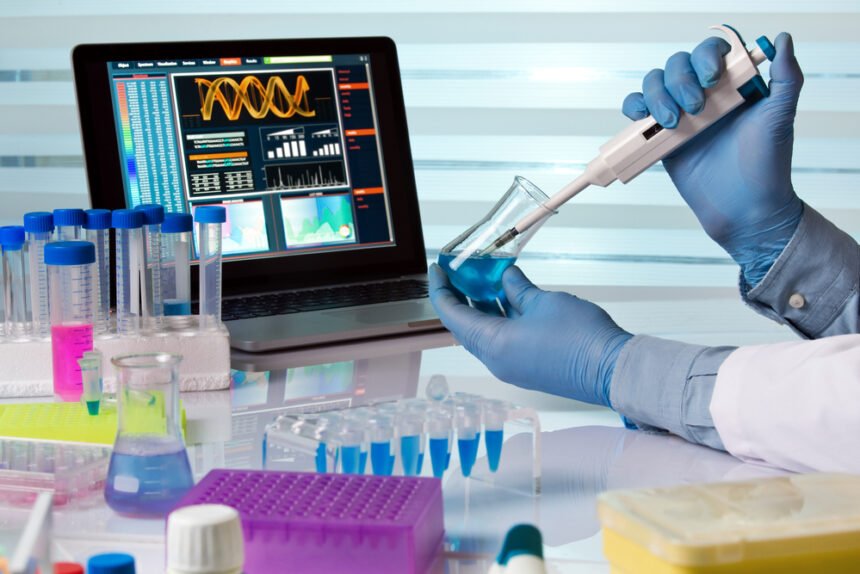There is no denying the reality that scientific breakthroughs are behind most major advances in medicine. We addressed this in one of our posts on the role of science in the field of periodontology. But have you ever wondered what types of medical innovations are most important?
Chemical research has played a very important role in the development of new medical procedures and technology. Anybody that wants to be on top of new medical breakthroughs should understand the impact that new discoveries on cutting-edge chemicals will play.
Have you ever wondered what’s really on the cutting edge of science? What kinds of discoveries are happening in research labs and universities around the world that could change our lives in the next 5-10 years? There are scientists pushing the boundaries of human knowledge in fields like biotech, computing, medicine, and more. They’re using powerful new tools like artificial intelligence, gene editing, and new materials to make breakthroughs at an incredible pace. We mentioned that chemical peels have some amazing benefits, but that only scratches the surface of some of the important medical benefits of chemical research.
In this article, we’ll explore some of the most exciting frontiers of scientific research and the ‘research chemicals’ enabling progress, more on Safrole. From radical new cancer treatments and bionic limbs controlled by thought to solar cells as thin as paper and quantum computers that could revolutionize AI, science is advancing in mind-blowing ways. The future is happening now, and it’s both strange and thrilling. Ready to take a peek at what’s next? Let’s dive in.
How Research Chemicals Enable Scientific Discovery
There are many compelling reasons that chemical research is affecting the future of the medical industry. Of course, one of the most obvious benefits is that it helps with the development of new drugs. However, the advantages of chemical research in healthcare go far beyond that.
Research chemicals are compounds that scientists use to push the boundaries of what we know and usher in new discoveries. By experimenting with these chemicals, researchers are able to explore uncharted scientific territory.
- Psychoactive research chemicals, for example, enable neuroscientists to better understand how the human brain works. Scientists can observe how certain receptors respond to different compounds, which helps them develop new treatments for mental health disorders.
- Other research chemicals are used to explore the potential of new materials. Strange compounds with unique properties are synthesized and tested to see if they could be useful for applications like superconductors, quantum computing, or space travel.
- Many life-changing medicines were first discovered by screening thousands of research chemicals to find ones with promising effects. For example, the first antidepressant and antipsychotic drugs were found this way. Research chemicals continue to enable drug discovery for conditions lacking good treatment options.
While research chemicals do come with risks, their careful and regulated use has led to countless breakthroughs that have changed the world for the better. Last year, scientists discovered a new chemical that can kill highly resilient cancer cells. With an expanding array of tools and techniques, scientists are synthesizing and screening more and more compounds, pushing the frontiers of knowledge at an incredible pace. Who knows what discoveries await in this new age of scientific exploration? The possibilities seem endless.
Research chemicals represent the cutting edge of science and technology. By enabling researchers to explore the unknown, they drive innovation that improves lives through new treatments, materials, and a deeper understanding of ourselves and the universe. The future is bright, and research chemicals will help light the way.
The Cutting Edge: Emerging Areas of Chemical Research
Some of the most exciting areas of chemical research today are happening at the cutting edge. Scientists are pushing the boundaries of what we know about materials, energy, and the natural world.
- Nanotechnology deals with materials at the molecular scale. Researchers are designing nanoparticles for targeted drug delivery, super-efficient solar cells, and more. The possibilities seem endless, but safety and ethics must be considered with such a powerful new technology.
- Renewable energy is another hot area of research. Chemists are working on better batteries to store energy from solar and wind, developing biofuels from agricultural waste, and improving fuel cell technology to one day power our vehicles and homes. The goal is clean, sustainable energy for everyone.
- Synthetic biology aims to design biological systems for useful purposes. Scientists have already created synthetic DNA, artificial cells, and genetically engineered microbes that can produce drugs, biofuels, and biomaterials. CRISPR gene editing allows precise changes to DNA. While promising, we must ensure these technologies are used responsibly.
- Quantum computing could revolutionize how chemists model molecules and simulate chemical reactions. Researchers are building quantum computers that harness the strange physics of subatomic particles to solve certain problems much faster than regular computers. The potential for chemistry and beyond is huge.
Chemistry powers the modern world, and researchers are pushing the frontiers of science to improve lives, help the planet, and satisfy our curiosity about how the universe works. The future is bright, but we must guide these powerful new technologies onto a path that benefits humanity. The cutting edge is exciting, but we must proceed with wisdom, care, and vision.
A Vision for the Future: Where Chemical Research May Lead Us
The future of chemical research is an exciting frontier filled with possibilities to improve our lives and expand our understanding of the world around us. As technology and computing power continue to accelerate, scientists are gaining access to new tools that allow them to manipulate and analyze chemicals in ways never before possible.
Advancing Medicine and Health
New chemical compounds are being developed and tested as potential treatments for diseases and medical conditions. Precision medicine, where treatments are tailored to a person’s unique genetic makeup and health conditions, is becoming a reality. Microbiome research is yielding insights into how the bacteria in our gut and on our skin influence our health, mood, and development. These discoveries could lead to probiotic treatments and customized diets based on a person’s microbiome.
Renewable Energy and Environmental Solutions
Chemists are creating new materials and processes to generate renewable energy and remove pollution from the environment. Perovskite solar cells, graphene supercapacitors, and other technologies could make solar and wind energy cheaper and more efficient. New catalysts are enabling the efficient conversion of waste carbon dioxide and methane into useful fuels and chemicals. Other scientists are developing biodegradable plastics, greener industrial processes, and new ways to filter contaminants from the air and water.
Quantum Computing and Materials
At the smallest scales, quantum effects allow particles to behave in strange ways, enabling exotic states of matter and new materials with amazing properties. Harnessing quantum phenomena could lead to more powerful computing, ultra-precise sensors, and materials with useful applications like superconductivity or programmable magnetism. While still, mostly theoretical, quantum computing and materials science will likely drive future technological revolutions if scientists can gain a better understanding of the quantum world.
The future is unwritten, but chemical research will undoubtedly help shape it. By pushing the boundaries of science and technology, chemists are poised to improve lives, advance knowledge, and build a more sustainable future. The possibilities seem endless, limited only by our imagination and perseverance in the pursuit of discovery.
Conclusion
So there you have it, a glimpse into the cutting edge of scientific progress and the promising research chemicals fueling innovation. While these advancements push the boundaries of human knowledge and capabilities, they also come with risks and ethical considerations that require prudent oversight and regulation. But overall, the future looks bright as researchers continue exploring the frontiers of science and technology. Who knows what life-changing discoveries are right around the corner, waiting to be found in a lab somewhere by a curious mind and a few novel molecules. The possibilities seem endless.










